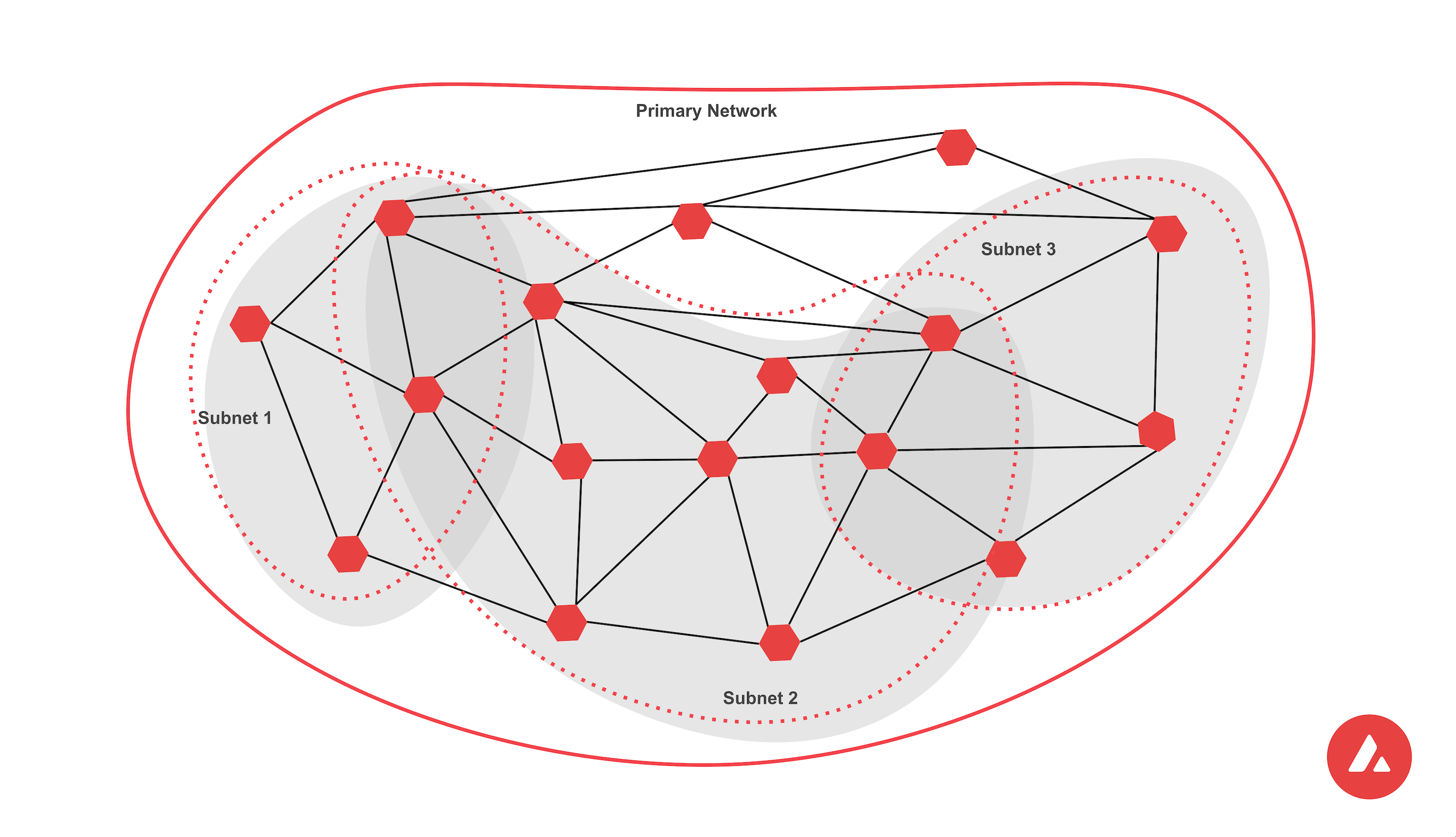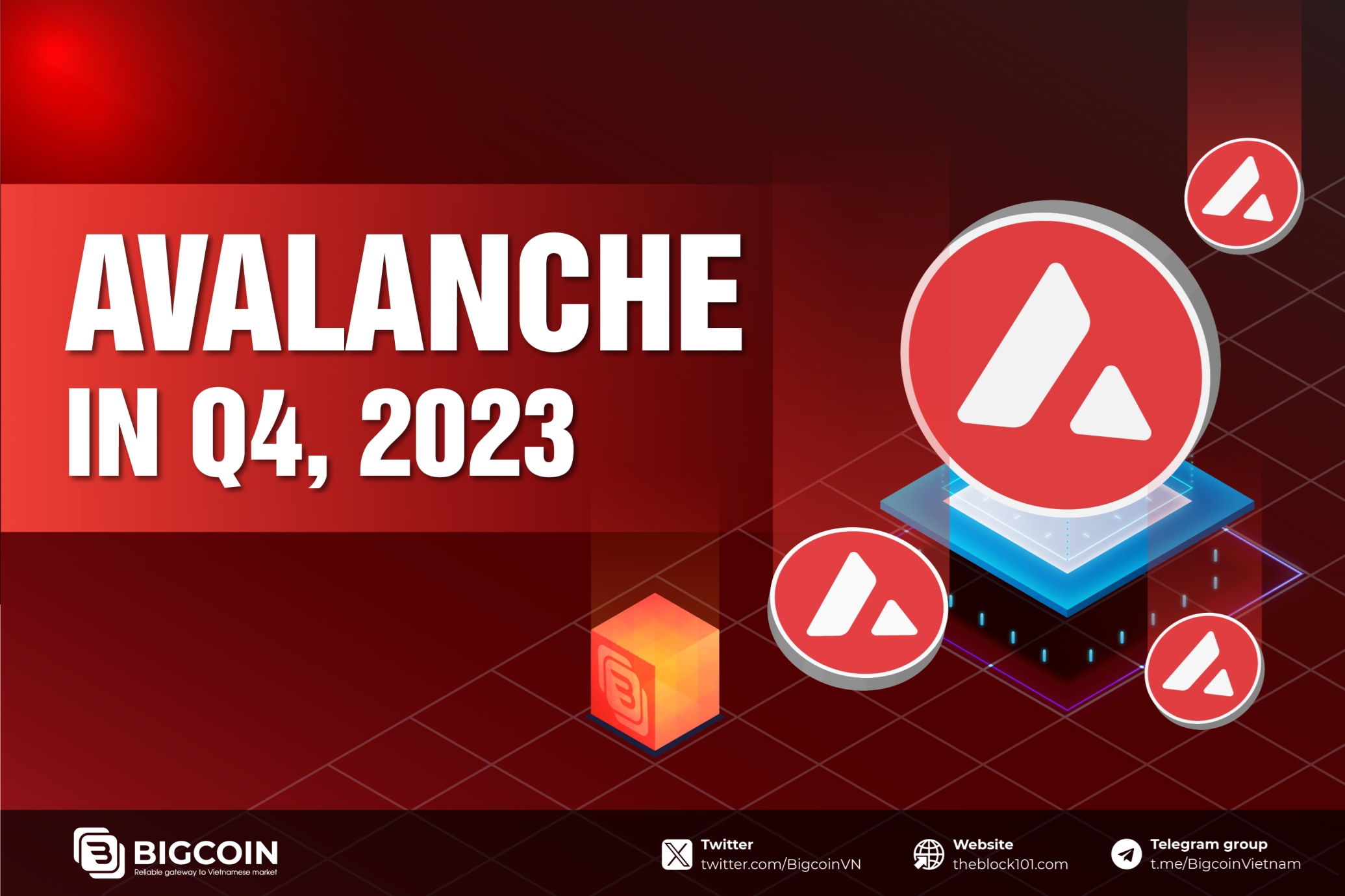1. What is Subnet?
.jpg)
Subnet (Subnetwork) is an expansion solution within the Avalanche framework, enabling individuals to create a Layer 1 blockchain effortlessly.
A Subnet functions as an independent network comprising a group of validators collaborating to establish coherence in the state of one or multiple blockchains.
The overall count of Subnets within the Avalanche network is subject to constant fluctuations, evolving as more subnetworks are integrated over time. Likewise, the number of validators within any given Subnet tends to be variable, as nodes frequently exercise the freedom to join or depart at their discretion.
The Avalanche Foundation introduced the Avalanche Multiverse initiative, a program incentivizing with a value of $290 million aimed at fostering the development of Subnets on the platform in March 2022.
2. The advantages of Subnets

2.1. Scalability
This is the foremost benefit of Subnets. Each Subnet is an independent entity, eliminating the need to compete with other Subnets for network resources, thereby facilitating easy integration.
2.2. Gas Fee Reduction
Traditional blockchains often face challenges related to network congestion. Subnets address this issue by reducing network traffic, leading to lower transaction costs for users.
2.3. Increased Transactions Per Second (TPS)
Subnets contribute to quicker response times, enhancing the system's ability to process a higher number of transactions per second (TPS).
2.4. Interactivity Capability
Users can engage in cross-chain transfers without the necessity to interact with the X-Chain directly, thereby reinforcing the entire Subnet system.
2.5. Selective Verification
Validators have the autonomy to participate solely in blockchains relevant to their interests in a subnet-divided system like Avalanche. This prevents Avalanche validators from being overwhelmed by performance demands imposed by unrelated blockchains.
2.6. Customizable Expansion Options
Users enjoy flexibility in tailoring Subnets to meet their specific requirements.
3. Subnet use cases
Subnets have the capacity to support various projects and diverse activities. Subnets exhibit versatility in providing assistance to various projects and activities. The decentralized gaming sector particularly benefits from Subnets, as these games can seamlessly function on the Avalanche platform without being impeded by network congestion.
In addition to promoting the growth of blockchain gaming, the framework is also directed towards supporting endeavors in Non-Fungible Tokens (NFTs) and Decentralized Finance (DeFi). Avalanche's Subnets offer a conducive environment for the implementation of these specific protocols.
4. Top Avalanche Subnets
.png)
4.1. DFK Subnet - DeFi Kingdoms
In the realm of prominent Subnets on the Avalanche network, DeFi Kingdoms emerges as a noteworthy example. Recognized for its fusion of blockchain-based gaming incorporating NFTs and DeFi, DeFi Kingdoms notably secured an initial grant of $15 million from the Avalanche Foundation.
Introducing its dedicated Subnet, named the DFK Subnet, this blockchain is developed by Ava Labs, boasting compatibility with the Ethereum Virtual Machine (EVM) and leveraging the Proof-of-Stake (PoS) consensus mechanism.
.png)
The principal objective motivating DeFi Kingdoms in establishing the DFK Subnet is the creation of a highly scalable, secure, and unburdened ecosystem, specifically designed for community members and Web3 projects. This strategic initiative aligns with the broader ambition of fortifying the Avalanche network with innovative and resilient blockchain solutions.
4.2. Beam Subnet - Merit Circle
Merit Circle, a self-governing organization within the metaverse, has recently unveiled a Subnet focused on gaming within the Avalanche ecosystem.
Beam operates as an independent blockchain, enabling players to engage in NFT games where they can fully own and control their assets.
4.3. Blitz Subnet - Blitz
Blitz is an application closely associated with gaming, delivering real-time information and analysis for various popular online games like League of Legends, Valorant, and Teamfight Tactics.
The application provides detailed statistics for each game, character-building guides, strategic approaches, and personalized advice to enhance gameplay. The Subnet will serve as the infrastructure for activities including registration, in-game currency, Blitz Battle Rewards, Marketplace, and various other features.
4.4. DOS Subnet - DOS Labs
DOS Labs, a distinguished game studio, emerges as a noteworthy Subnet in the gaming industry. Leveraging a specialized and tailored blockchain, DOS Labs empowers developers to create sophisticated games without encountering the challenges of network overload and delayed response times, common in ecosystems where all transactions occur within a unified framework.
DOS Chain implements a unique consensus algorithm developed by Cornell's team of computer scientists. This algorithm facilitates transaction processing in less than a second. DOS Chain presently boasts the capability to handle 4,500 transactions per second, fortifying network security, implementing customizable rule sets, and ensuring compatibility with a range of Ethereum tools, including MetaMask, Remix Truffle, and others.
4.5. Dexalot Subnet - Dexalot Exchange
Dexalot, a relatively popular decentralized exchange (DEX), introduced its own Subnet in February 2023, transforming the decentralized, on-chain trading experience on the platform to closely resemble centralized exchanges.
Traders on Dexalot can now enjoy swift transactions, low transaction fees, and a user-friendly interface with minimal price slippage. The Hybrid Subnet architecture enables users to securely stake their assets on the Avalanche C-chain and utilize these assets for trading on the Dexalot Subnet. Dexalot has also implemented Avalanche wrap messaging (AWM) to enhance platform performance and overall security.
4.6. MELD Subnet - MELD
MELD has introduced its own dedicated Subnet on Avalanche, providing users with a unified ecosystem to manage their crypto and fiat assets without encountering any complexities.
MELD maintains complete control over the security aspects of its infrastructure, enabling sustained interaction with other Subnets. This enhances the overall network performance while concurrently affording users greater control over their assets.
4.7. Mintara Subnet - Playthink Inc
Playthink Inc. has introduced the blockchain 'Mintara' in the form of Avalanche Subnets.
Mintara primarily aims to enhance the capabilities of web3 for business activities, specifically in areas such as NFT distribution to improve communication with customers.
Mintara operates as a private chain, allowing users to conduct transactions without incurring fees in crypto tokens. This not only speeds up transaction processing but also ensures compatibility with other Subnets.
Leveraging Ava Cloud, Mintara achieves high compatibility with the Ethereum Virtual Machine (EVM) and a comprehensive ecosystem of assets supported by Ethereum.
4.8. Evergreen
.png)
Evergreen comprises a toolkit and a set of features developed to fulfill the needs and use cases of financial companies.
4.9. Shrapnel Subnet - Shrapnel
Shrapnel - a highly anticipated GameFi project on Avalanche, has introduced its dedicated Subnet on the Avalanche network for the deployment of a first-person shooter (FPS) game. The Subnet provides Shrapnel with an independent and fully customizable ecosystem, optimized for high performance and recoverability.
The Subnet allows Shrapnel to deliver optimal performance through innovative architecture, Snow Consensus, and enterprise-grade security. Players can purchase and own NFT avatars as well as other in-game assets, leveraging the full value of the play-to-earn gaming model with Shrapnel's FPS game.
5. Conclusion
The aforementioned article covers Subnets and highlights the nine most prominent Subnets on the Avalanche network. It is hoped that you have found this information valuable.
For further updates on Subnets, you may refer to the following website:
Avalanche Subnets: https://subnets.avax.network/subnets/
Readmore:

 English
English Tiếng Việt
Tiếng Việt





